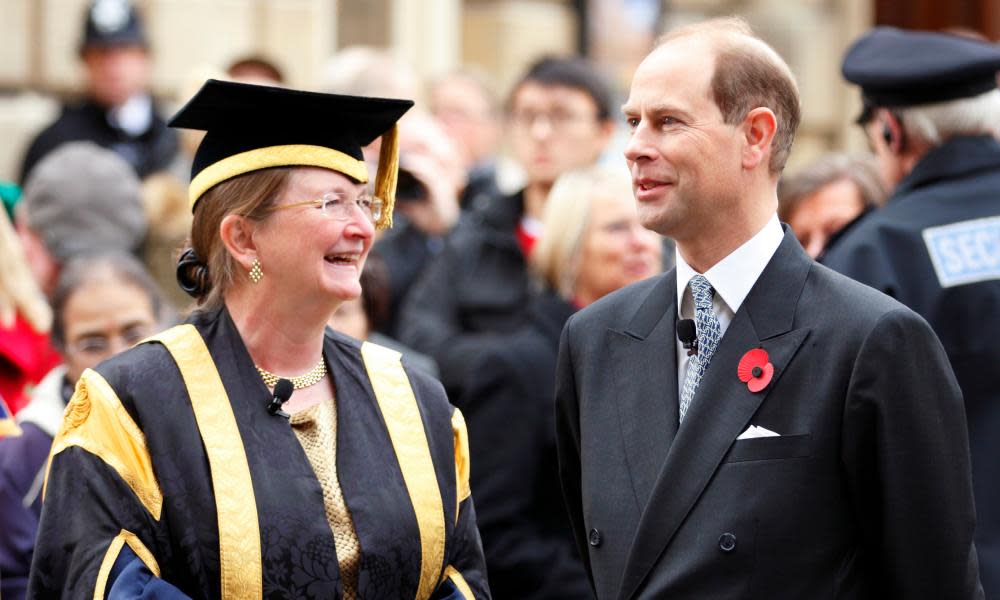Bath University staff plan urgent meeting over vice-chancellor's pay

Staff at Bath University are to hold an emergency meeting to discuss “deep anger and concern” at the institution’s leadership, after a report from the higher education regulator found its reputation had been damaged by controversy over the vice-chancellor’s pay.
Union leaders say that student open days at Bath have become “embarrassing” with questions about the high levels of pay received by Bath’s vice-chancellor, Glynis Breakwell, whose £468,000 in salary and benefits are the highest of any university leader in the country.
Students at Bath are also planning to hold protests next week over the high pay awarded to Breakwell and the university’s lack of transparency and accountability in handling objections.
A student group, Bath Students Against Fees and Cuts, says it is organising a demonstration to be held on 30 November to coincide with a meeting of the university’s council. Some members of staff are also likely to protest.
“She has the highest salary in the country, a free multimillion-pound house, a free cleaner, an interest-free loan for her car, and claimed £20,000 in expenses last year, including £2 for biscuits,” the group notes in its call for the demonstration.
The staff unions represented on the Bath campus – Unison, Unite and the Universities and Colleges Union (UCU) – have called the meeting for Wednesday afternoon to discuss the report by the Higher Education Funding Council of England (Hefce) into complaints about Bath’s pay decisions for the vice-chancellor.
The Hefce report was highly critical of Bath’s decision-making process, and called the university’s efforts to deal with objections to pay levels “flawed”.
The Wednesday meeting is also billed to discuss “confidence in the vice-chancellor and governors” – with union members reporting that staff had been told to remove posters advertising the meeting on campus.
“We believe the time has come for a fresh start if the university is to recover its reputation as a centre of academic excellence,” a spokesperson for UCU said on Tuesday.
“The vice-chancellor and governing body inspire no confidence and should step aside. There is deep anger and concern at the way the university has handled this.
“University open days now mean embarrassing questions about overpaid managers and poor governance. It is making life difficult for all the staff and we will be meeting tomorrow to discuss how we can best make our voices heard and start to work to improve things.”
University of Bath Corporate Communications staff ordered to run around campus removing notices of all-staff meeting tomorrow. Desperate measures from management who won't take responsibility for crisis. Staff confidence lost. #VCPay @ucu pic.twitter.com/rK50mzku61
— Bath UCU (@UCUBath) November 21, 2017
The staff meeting will precede a meeting of the university’s senate attended by Breakwell, and will be her first official appearance since the report was published.
The revelation of the Bath vice-chancellor’s pay has created a public debate over the high wages paid to university leaders, as rising levels of student debt in England became a major political issue.
While tuition fees have risen from £3,000 in 2006 to £9,250 a year, over the same period vice-chancellors’ salaries have risen from an average of £165,000 in 2006 to more than £257,000 in 2016.
Hefce examined governance at the annual meeting of Bath’s university court in February, after members raised concerns about the vice-chancellor’s pay and “the lack of transparency and accountability” of the remuneration committee.
The concerns were quashed after a show of hands. But the report found no advice was given about declarations of interest, and there were no records of who voted. Some members of the remuneration committee, and those whose pay is decided by it, including Breakwell, voted against the motion.
The Hefce report concluded: “The university’s handling of the motion proposed by a court member about the conduct of the remuneration committee at the court meeting of 23 February 2017 was flawed and has, in our view, resulted in damage to the reputation of the university.”

 Yahoo News
Yahoo News 
